高一英语上学期unit1
- 格式:ppt
- 大小:640.00 KB
- 文档页数:32

人教版新版英语必修一高一上第一单元单词表第一部分:单词1. announce [əˈnaʊns] v. 宣布,通告2. attempt [əˈtempt] v. 企图,尝试3. avoid [əˈvɔɪd] v. 避免4.munity [kəˈmjuːnəti] n. 社区5. condition [kənˈdɪʃn] n. 状况,条件6. divide [dɪˈvaɪd] v. 分割,分开7. educate [ˈɛdʒʊkeɪt] v. 教育8. equip [ɪˈkwɪp] v. 装备,配备9. examine [ɪgˈzæmɪn] v. 检查10. preserve [prɪˈzɜ:v] v. 保护,保存第二部分:词组1. a great deal 大量2. adjust to 适应3.e up with 提出,想出4. contribute to 促成,有助于5. figure out 想出,理解6. in addition 另外7. in danger 处于危险当中8. in particular 特别,尤其9. on purpose 故意地10. take out 取出,取走第三部分:例句1. The school will announce the result of the exam next Monday. 学校将在下周一宣布考试结果。
2. The scientist made an attempt to solve the mystery of the universe.这位科学家试图解决宇宙之谜。
3. I try to avoid eating too much junk food.我尽量避免吃太多垃圾食品。
4. Ourmunity has a strong sense of unity and belonging.我们的社区有很强的团结和归属感。
5. The condition of the roads in the rural areas is not very good. 农村地区的道路条件不太好。
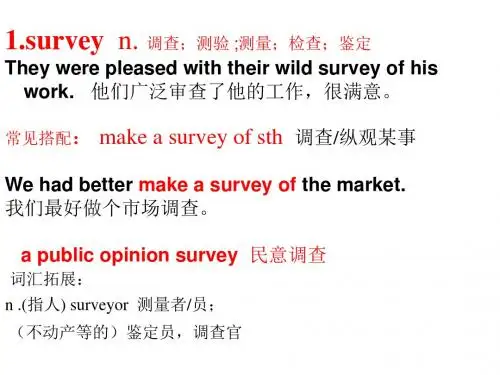
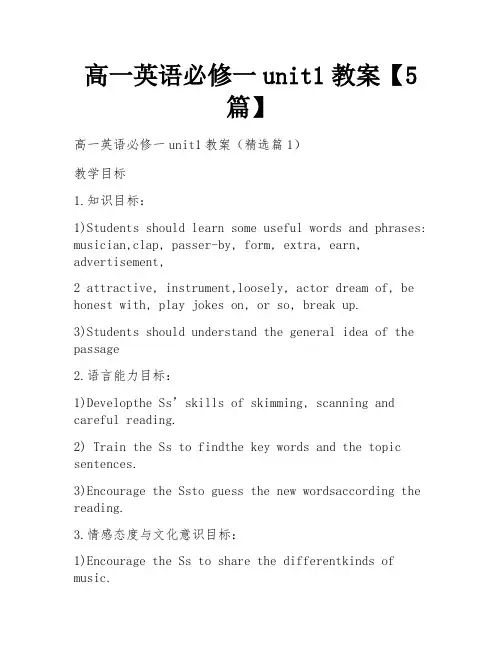
高一英语必修一unit1教案【5篇】高一英语必修一unit1教案(精选篇1)教学目标1.知识目标:1)Students should learn some useful words and phrases: musician,clap, passer-by, form, extra, earn, advertisement,2 attractive, instrument,loosely, actor dream of, be honest with, play jokes on, or so, break up.3)Students should understand the general idea of the passage2.语言能力目标:1)Developthe Ss’skills of skimming, scanning and careful reading.2) Train the Ss to findthe key words and the topic sentences.3)Encourage the Ssto guess the new wordsaccording the reading.3.情感态度与文化意识目标:1)Encourage the Ss to share the differentkinds of music.2)Improve the cooperation and share among the students.教学重难点1、教学重点:a.To understudend the passage better b.To find the main idea of eachparagraph2、教学难点:a.Master the reading ability b.Develop the skills ofreading教学过程教学设计本节课共45分钟,具体教学步骤如下:Step I Leading-in播放一段小视频,内容为歌曲 If you arehappy的英文版本,通过介绍演唱乐队twins引出本单元话题。
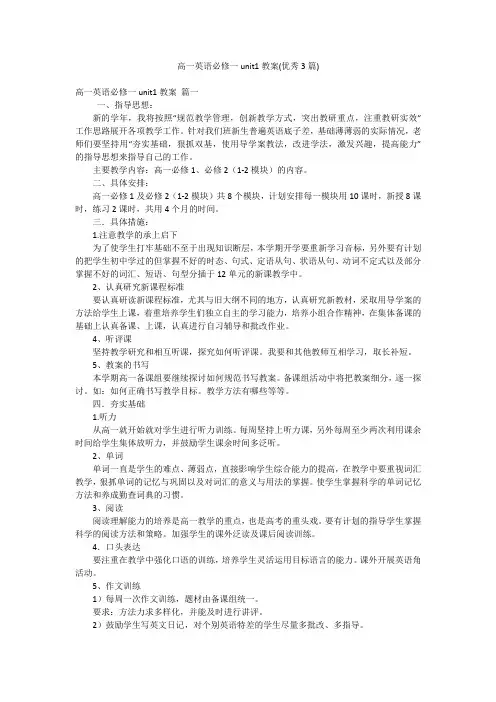
高一英语必修一unit1教案(优秀3篇)高一英语必修一unit1教案篇一一、指导思想:新的学年,我将按照“规范教学管理,创新教学方式,突出教研重点,注重教研实效”工作思路展开各项教学工作。
针对我们班新生普遍英语底子差,基础薄薄弱的实际情况,老师们要坚持用“夯实基础,狠抓双基,使用导学案教法,改进学法,激发兴趣,提高能力”的指导思想来指导自己的工作。
主要教学内容:高一必修1、必修2(1-2模块)的内容。
二、具体安排:高一必修1及必修2(1-2模块)共8个模块,计划安排每一模块用10课时,新授8课时,练习2课时,共用4个月的时间。
三.具体措施:1.注意教学的承上启下为了使学生打牢基础不至于出现知识断层,本学期开学要重新学习音标,另外要有计划的把学生初中学过的但掌握不好的时态、句式、定语从句、状语从句、动词不定式以及部分掌握不好的词汇、短语、句型分插于12单元的新课教学中。
2、认真研究新课程标准要认真研读新课程标准,尤其与旧大纲不同的地方,认真研究新教材,采取用导学案的方法给学生上课,着重培养学生们独立自主的学习能力,培养小组合作精神,在集体备课的基础上认真备课、上课,认真进行自习辅导和批改作业。
4、听评课坚持教学研究和相互听课,探究如何听评课。
我要和其他教师互相学习,取长补短。
5、教案的书写本学期高一备课组要继续探讨如何规范书写教案。
备课组活动中将把教案细分,逐一探讨。
如:如何正确书写教学目标。
教学方法有哪些等等。
四.夯实基础1.听力从高一就开始就对学生进行听力训练。
每周坚持上听力课,另外每周至少两次利用课余时间给学生集体放听力,并鼓励学生课余时间多泛听。
2、单词单词一直是学生的难点、薄弱点,直接影响学生综合能力的提高,在教学中要重视词汇教学,狠抓单词的记忆与巩固以及对词汇的意义与用法的掌握。
使学生掌握科学的单词记忆方法和养成勤查词典的习惯。
3、阅读阅读理解能力的培养是高一教学的重点,也是高考的重头戏。
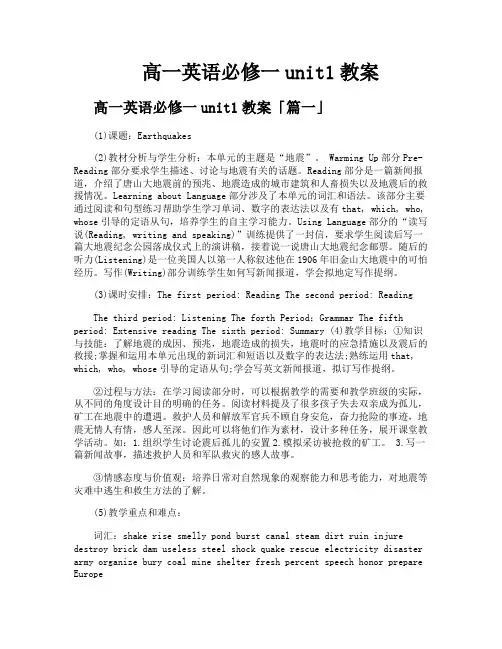
高一英语必修一unit1教案高一英语必修一unit1教案「篇一」(1)课题:Earthquakes(2)教材分析与学生分析:本单元的主题是“地震”。
Warming Up部分Pre-Reading部分要求学生描述、讨论与地震有关的话题。
Reading部分是一篇新闻报道,介绍了唐山大地震前的预兆、地震造成的城市建筑和人畜损失以及地震后的救援情况。
Learning about Language部分涉及了本单元的词汇和语法。
该部分主要通过阅读和句型练习帮助学生学习单词、数字的表达法以及有that, which, who, whose引导的定语从句,培养学生的自主学习能力。
Using Language部分的“读写说(Reading, writing and speaking)”训练提供了一封信,要求学生阅读后写一篇大地震纪念公园落成仪式上的演讲稿,接着说一说唐山大地震纪念邮票。
随后的听力(Listening)是一位美国人以第一人称叙述他在1906年旧金山大地震中的可怕经历。
写作(Writing)部分训练学生如何写新闻报道,学会拟地定写作提纲。
(3)课时安排:The first period: Reading The second period: ReadingThe third period: Listening The forth Period:Grammar The fifth period: Extensive reading The sixth period: Summary (4)教学目标:①知识与技能:了解地震的成因、预兆,地震造成的损失,地震时的应急措施以及震后的救援;掌握和运用本单元出现的新词汇和短语以及数字的表达法;熟练运用that, which, who, whose引导的定语从句;学会写英文新闻报道,拟订写作提纲。
②过程与方法:在学习阅读部分时,可以根据教学的需要和教学班级的实际,从不同的角度设计目的明确的任务。

高一英语上册unit1的单词1. teenage / ˈti:neɪdʒ/adj. 十几岁的(指13至19岁); 青少年的2. teenager / ˈti:neɪdʒə(r)/ n. (13至19岁之间的) 青少年3. ballet /ˈbæleɪ/ n. 芭蕾舞;芭蕾舞剧4. volunteer /ˌvɒlənˈtɪə(r)/ n. 志愿者5. debate /dɪ 'beɪt/ n. 辩论;争论vt.& vi.辩论;争论6. prefer / prɪˈfɜ:(r)/ vt. 较喜欢(preferred; preferred; preferring)7. prefer…to … 喜欢……多于……8. content / 'kɒntent / n. 内容; [pl] 目录; (书、讲话、节目等的)主题9. movement / ˈmu:vmənt / n. 动作;运动; 活动10. greenhouse / ˈgri:nhaʊs/ n. 温室;暖房11. clean up 打扫(或清除)干净12. suitable /ˈsu:təbl/ adj. 适合的;适用的13. suitable for 对……适合的14. actually / ˈæktʃuəli/ adv. 事实上; 的确15. challenge /ˈtʃæləndʒ/ n. 挑战;艰巨任务vt. 怀疑;向……挑战16. title /ˈtaɪtl/ n. (书、诗歌等的)名称;标题;职称;头衔17. topic /ˈtɒpɪk/ n. 话题; 标题18. freshman / ˈfreʃmən / n. (especially NAmE)(中学)九年级学生;(大学)一年级新生19. confusing /kənˈfju:zɪŋ/ adj. 难以理解的;不清楚的20. confuse /kən'fju:z/ vt. 使糊涂;使迷惑21. confused /kənˈfju:zd/ adj. 糊涂的;迷惑的22. fluent /'flu:ənt/ adj. (尤指外语)流利的;熟练的23. graduate /'ɡrædʒʊeɪt/ vi. & vt.毕业;获得学位/'ɡrædʒʊət/ n.毕业生24. recommend /ˌrekəˈmend/ vt. 建议;推荐;介绍25. sign up ( for sth) 报名(参加课程)26. advanced / ədˈvɑ:nst/ adj. 高级的;高等的;先进的27. advance / ədˈvɑ:ns / n. 前进;发展vi. 前进;发展vt. 发展;促进28. literature / ˈlɪtrətʃə(r)/ n. 文学; 文学作品29. extra-curricular / 'ekstrəkə'rɪkjulə/ adj. 课外的; 课程以外的30. extra /'ekstrə/ adj. 额外的;附加的31. obviously / ˈɒbviəsli/ adv. 显然地;明显地32. quit / kwɪt/ vi. & vt.(quit, quit) 停止;戒掉;离开(工作职位、学校等)33. responsible /rɪˈspɒnsəbl/ adj. 负责的;有责任的34. responsibility /rɪˌspɒnsəˈbɪləti/ n. 责任;义务35. be responsible for 对……负责36. solution / səˈlu:ʃn/ n. 解决办法; 答案37. schedule /ˈʃedju:l/ n. 工作计划;日程安排vt. 安排;预定38. editor /ˈedɪtə(r)/ n. 主编;编辑;编者39. plate /pleɪt/ n. 盘子,碟子40. adventure /ədˈventʃə(r)/ n. 冒险; 奇遇41. youth /ju:θ/ n. 青年时期; 青春42. survival /səˈvaɪvl/ n. 生存;幸存;幸存事物43. expert /'ekspɜːt/ n. 专家;行家adj.熟练的;内行的;专家的44. behaviour /bɪˈheɪvjə(r)/ n. 行为; 举止45. generation /ˌdʒenəˈreɪʃn/ n. 一代(人)46. attract /ə'trækt/ vt. 吸引;引起……的注意(或兴趣)47. be attracted to 喜爱48. focus /ˈfəʊkəs / vi.& vt. 集中(精力、注意力等);(使)调节焦距n. 中心;重点;焦点49. focus on 集中;特别关注50. addicted /əˈdɪktɪd/ adj. 有瘾的;上瘾的;入迷的51. addict /ˈædɪkt/ n. 对……入迷的人;吸毒成瘾的人52. addicted to 对……很入迷53. adult /ˈædʌlt/ n. 成年人adj.成年的;成熟的。

高一英语上第1次课教学目标:1.掌握unit1重点词组及词汇2.掌握直接引语变间接引语(一)3.综合训练—阅读理解一、词汇记忆①单词听写:1. upset 不安的2. loose 松的,松开的3. thunder 雷声,打雷4. power 能力,能量,权利5. dusty 积满灰尘的6. settle 安家,定居,使定居7. highway 公路,大路8. pack 捆扎,包装,打包行李9. overcoat 大衣,外套10. exactly 确实如此,正是11. grateful 感激的,表示感谢的12. tip 提示;技巧;小费②词组听写:1. add up 合计2. be concerned about 关心,挂念3. a series of 一连串,一系列,一套4. at dusk 在黄昏时刻5. no longer /not…any more 不再…6. get/be tired of 对……厌烦7. fall in love with 相爱,爱上8. calm……down 使平静下来9. go through 经历,经受10. on purpose 故意11. face to face 面对面地12. set down 记下,放下13. in order to 为了……14. suffer from 遭受,患病15. join in 参加,加入16. get along with 与……相处,进展二、直接引语和间接引语(一)复习宾语从句宾语从句三要素:语序、连接词、时态。
1、语序:陈述句语序2、连接词:①陈述句用that引导;②一般疑问句用if/whether引导;③特殊疑问句用特殊疑问词引导3、时态:①主句用过去时,从句用与过去相对应的时态;②主句是一般现在时,从句可根据实际情况用任何时态;③表示客观真理时用一般现在时;(二)直接引语和间接引语的概念:当我们用引号引出别人的原话时,被引用的部分称为直接引语,如:The boy said ,"I can speak English very well.”当我们间接地把别人的意思转述出来时,被转述的部分称为间接引语,如:Mary said that Tom had worked there before.由宾语从句我们知道,直接引语转为间接引语之后即为一个宾语从句,因此,直接引语变为间接引语时,人称、时态、引导词、状语和语序都会发生变化。
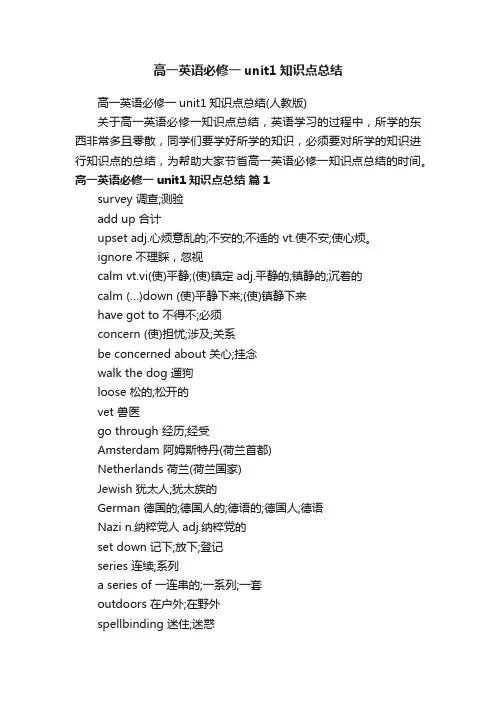
高一英语必修一unit1知识点总结高一英语必修一unit1知识点总结(人教版)关于高一英语必修一知识点总结,英语学习的过程中,所学的东西非常多且零散,同学们要学好所学的知识,必须要对所学的知识进行知识点的总结,为帮助大家节省高一英语必修一知识点总结的时间。
高一英语必修一unit1知识点总结篇1survey 调查;测验add up 合计upset adj.心烦意乱的;不安的;不适的 vt.使不安;使心烦。
ignore 不理睬,忽视calm vt.vi(使)平静;(使)镇定 adj.平静的;镇静的;沉着的calm (…)down (使)平静下来;(使)镇静下来have got to 不得不;必须concern (使)担忧;涉及;关系be concerned about 关心;挂念walk the dog 遛狗loose 松的;松开的vet 兽医go through 经历;经受Amsterdam 阿姆斯特丹(荷兰首都)Netherlands 荷兰(荷兰国家)Jewish 犹太人;犹太族的German 德国的;德国人的;德语的;德国人;德语Nazi n.纳粹党人adj.纳粹党的set down 记下;放下;登记series 连续;系列a series of 一连串的;一系列;一套outdoors 在户外;在野外spellbinding 迷住;迷惑on purpose 故意in order to 为了…dusk 黄昏;傍晚at dusk 在黄昏时刻thunder v打雷;雷鸣;n雷;雷声entire 整个的;完全的;全部的entirely 完全地;全然地;整个地power 能力;力量;权力face to face 面对面地curtain 窗帘;门帘;幕布dusty 积满灰尘的no longer ot…any longer 不再partner 伙伴;合作者;合伙人settle 安家;定居;停留使定居;安排;解决suffer 遭受;忍受;经历suffer from 遭受;患病loneliness 孤单;寂寞highway 公路;大路;<美>高速公路recover 痊愈;恢复;重新获得gete tired of 对…厌烦pack 捆扎;包装;打行李小包;包裹pack(sth)up 将(东西)装箱打包suitcase 手提箱;衣箱overcoat 大衣;外套teenager 十几岁的青少年get along with 与…相处;发展gossip 闲话;闲谈fall in love 相爱爱上exactly 确实如此;正式;确切地disagree 不同意grateful 感激的;表示谢意的dislike 不喜欢;厌恶join in 参加;加入tip n.揭示;技巧;尖;尖端;消费 vt. 倾斜; 翻到secondly 第二;其次swap 交换item 项目;条款高一英语必修一unit1知识点总结篇2各种时态的被动语态被动语态概述被动语态的概念:它是动词的一种形式,表示主语与谓语之间的执行或被执行关系。
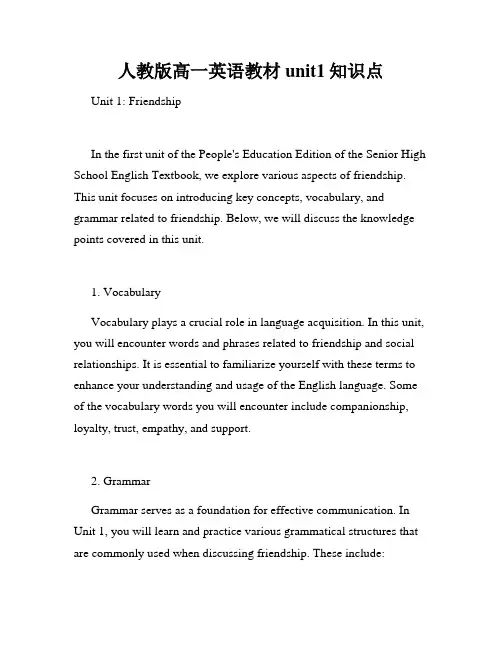
人教版高一英语教材unit1知识点Unit 1: FriendshipIn the first unit of the People's Education Edition of the Senior High School English Textbook, we explore various aspects of friendship. This unit focuses on introducing key concepts, vocabulary, and grammar related to friendship. Below, we will discuss the knowledge points covered in this unit.1. VocabularyVocabulary plays a crucial role in language acquisition. In this unit, you will encounter words and phrases related to friendship and social relationships. It is essential to familiarize yourself with these terms to enhance your understanding and usage of the English language. Some of the vocabulary words you will encounter include companionship, loyalty, trust, empathy, and support.2. GrammarGrammar serves as a foundation for effective communication. In Unit 1, you will learn and practice various grammatical structures that are commonly used when discussing friendship. These include:a. Comparatives and superlatives: These are used to make comparisons between two or more people or things. For example, "Jane is taller than Sara" or "This is the most beautiful flower."b. Prepositions of time and place: Proper usage of prepositions such as "at," "in," and "on" is essential for indicating time and location accurately. For example, "Let's meet at the park" or "The party is on Saturday."c. Conditional sentences: These are used to express hypothetical situations or consequences. You will learn about different types of conditional sentences such as zero conditionals, first conditionals, and second conditionals. For example, "If it rains, I will bring an umbrella."3. Reading ComprehensionUnit 1 includes various reading passages that focus on friendship and its significance. These passages are designed to improve your reading comprehension skills and help you extract essential information from the text. Pay attention to details, main ideas, and supporting evidence as you engage with these texts.4. Listening SkillsEffective communication involves both speaking and listening. In this unit, you will have the opportunity to practice your listening skills by engaging with dialogues related to friendship. Through these activities, you will develop your ability to understand spoken English and improve your overall listening comprehension.5. Writing ExercisesWriting is an essential skill that allows us to express our thoughts and ideas. In Unit 1, you will be given writing exercises that focus on topics related to friendship. These exercises will require you to express your opinions, share personal experiences, or write about fictional scenarios. Practice these writing tasks to enhance your ability to communicate effectively through writing.6. Speaking ActivitiesUnit 1 also includes speaking activities that encourage students to practice oral communication skills. These activities are designed to promote discussions and interactions among classmates. Engage in group discussions, role plays, and debates to improve your speaking abilities and gain confidence in expressing your ideas verbally.In conclusion, Unit 1 of the People's Education Edition of the Senior High School English Textbook covers various knowledge pointsrelated to friendship. By focusing on vocabulary, grammar, reading comprehension, listening skills, writing exercises, and speaking activities, this unit aims to enhance students' overall English proficiency and foster a deeper understanding of the importance of friendship in our lives.。

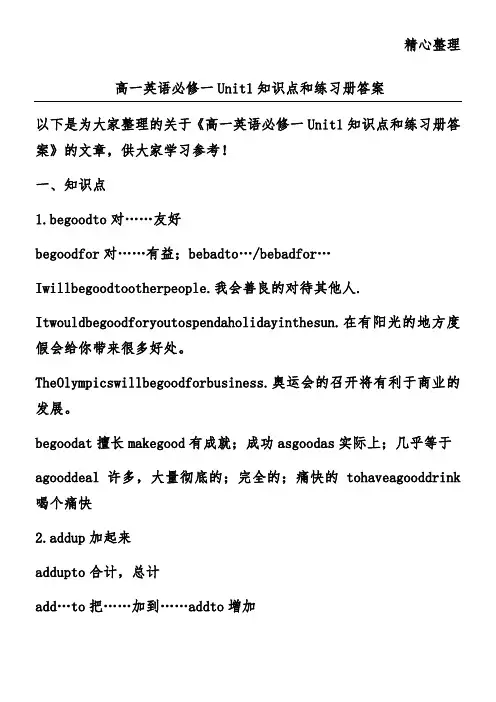
精心整理高一英语必修一Unit1知识点和练习册答案以下是为大家整理的关于《高一英语必修一Unit1知识点和练习册答案》的文章,供大家学习参考!2.addup加起来addupto合计,总计add…to把……加到……addto增加Addupyourscoreandseehowmanypointsyouget?把你的分数加起来,看看得多少?Somepeoplecanaddupquiteeasilyintheirheads,butnotall. Goodfriendsdonotaddupwhattheydoforeachother;insteadtheyoffe节日恶直到Theydidnotcomebackuntileleven.他们会在十一点后回来。
Ididnotnoticeituntilyesterday.我一直到昨天才注重到它。
4.Youhadtopaytogetitrepairedgetsthdone使……完成/让某人做某事5.Youwillignorethebellandgosomewherequiettocalmyourfrienddo wn.Isaidhellotoher,butsheignoredmecompletely!calm…down使平息,使平静t他儿Pleasedon’t beconcernedaboutme.请别为我操心。
Whyisshesoconcernedabouthisattitudetoherwork?她为什么那么关注他对她的工作的看法?7.Yourfriendhasgoneonholidayandaskedyoutotakecareofhisdog. goonholiday度假beonholiday正在休假Whatfunitwillbewhenweallgoonholidaytogether.我们大家一起去度假那可太有意思了.takecareof爱护,照料lth.狗的当某地theend-of-termexam.(非限制性定语从句)cheatintheexam考试作弊11.lookatsomeoneelse’spaper看别人的试卷12.makealistofreasons列举一些原因13.Doyouwantafriendwhomyoucouldtelleverythingto,likeyourdee pestfeelingsandthoughts?你想有一位无话不谈、能推心置腹的朋友吗?14.gothrough遭遇;经历;熬过;用光(钱);获准,通过火。
【导语】单词是构成英语⽂章的⾻架,背好了单词,英语的学习之路也就成功了⼀⼤步了。
下⾯是⽆忧考为你推荐⾼⼀必修⼀英语单词表,希望能帮到你。
survey调查;测验 add up合计 upset adj.⼼烦意乱的;不安的,不适的 ignore不理睬;忽视 calm vt.&vi.(使)平静;(使)镇定 adj.平静的;镇定的;沉着的 calm(……)down(使)平静下来 have got to不得不;必须 concern(使)担⼼;涉及;关系到 n.担⼼;关注;(利害)关系 be concerned about关⼼;挂念 walk the dog溜狗 loose adj松的;松开的 vet兽医 go through经历;经受 Amsterda阿姆斯特丹(荷兰⾸都) Netherlands荷兰(西欧国家) Jewish犹太⼈的;犹太族的 German德国的;德国⼈的;德语的。
Nazi纳粹党⼈ adj.纳粹党的 set down记下;放下;登记 series连续,系列 a series of⼀连串的;⼀系列;⼀套 outdoors在户外;在野外 spellbind迷住;疑惑 on purpose故意 in order to为了 dusk黄昏傍晚 at dusk在黄昏时刻 thunder vi打雷雷鸣;n.雷,雷声 entire adj.整个的;完全的;全部的 entirely adv.完全地;全然地;整个地 power能⼒;⼒量;权⼒。
face to face ⾯对⾯地 curtain 窗帘;门帘;幕布 dusty adj积满灰尘的 no longer /not … any longer不再 partner伙伴.合作者.合伙⼈ settle安家;定居;停留vt 使定居;安排;解决 suffer vt &遭受;忍受经历 suffer from遭受;患病 loneliness孤单寂寞 highway公路 recover痊愈;恢复 get/be tired of对…厌烦 pack捆扎;包装打⾏李 n⼩包;包裹 pack( sth )up 将(东西)装箱打包 suitcase⼿提箱;⾐箱 overcoat⼤⾐外套 teenager⼗⼏岁的青少年 get along with与…相处。
新版人教版高中英语必修一Unit1TeenagelifeSectingI知识点总结和习题新版人教版高中英语必修一Unit 1 Teenage lifeSecting I知识点和习题1.Volunteer Clubvolunteer(1)n志愿者,义务工作者;自告奋勇者Susan had quit her well-paid job and was working as a volunteer in the community when I visited her last year. (2)vi&vt 自愿(做某事),自告奋勇做某事。
常用搭配:volunteer to do sth.自愿/主动提出做某事volunteer for…自愿……;自愿为……服务According to the research, people feel good when they volunteer to do something meaningful for other people. He volunteered for military service.拓展:volunteer to do sth近义表达:offer to do sth主动提出做某事be willing /ready to do sth 愿意做某事voluntanry 自愿的;主动的;志愿的do voluntary work 做志愿工作voluntarily 自愿地;主动地2.Debate Club辩论社团debate(1)n 辩论,争论,讨论under debate正在讨论中/正在辩论中a heated/ lively detate 一场激烈/热烈的争论(2)vi&vt (尤指正式)辩论,讨论debate (with sb.) about/ on/ over sth. (与某人)辩论/讨论某事讨论:debate + 特殊疑问词+ to dodebate + wh-从句3.Predict content 预测内容predict vt 预言,预告,预测predict + wh-从句预演……predict (that) …预测……It’s predicted that…据预测/据预报……(It 做形式主语,that 引导的从句为真正的主语)The first step in awakening senses is to stop predicting what we are going to see and feel before it occurs.It’s difficult to predict who will because two side are competitive.She predicted (that) the election result would be close.It is predicted that the weather will get better tomorrow.拓展:predictable 预见的;可预料的unpredictable 不可预测的prediction 预言,预测make a prediction 做预言,做预测单词测试题单词拼写1. She kept the_______(内容) of the letter a secret.2. His parents thought it abnormal for a boy tobe interested in_______(芭蕾舞).3. Teachers have to bring on the bright childrenand at the same time give____(额外的) helpto those who need it.4. Children can often do these puzzlesmore easily than________(成年人),5. I found out by chance that she was actually a____________(一年级学生) from London University.6.Lewis was much admired for his work on American _________(文学).17. She was considered a great beauty in her_________(青年时期).8. Good books are like a wise and nice man of last____________(一代), who supports me to walk forward, and helps me to understand the world9. We know that_______(温室) gases can affect the climate.10. It is easy to forget that learning values andc haracter at home is as important as any schoolwork or __________(课外)activity.写作应用文写作(满分15分)假设你是李华,你收到朋友李磊的信,他告诉你他不适应高一数学老师讲的课,在学习数学方面有些困难,以至于跟不上其他同学,因此他感到非常着急。
Unit1 Reading for Writing 重难点词汇详解1. behaviour n. 行为;举止教材原文I recommend that you talk to your friend about his behaviour.我建议你和你的朋友谈一谈他的行为。
经典例句①What do you think of the host’s behaviour on stage that day?你怎样评价主持人那天在舞台上的行为?②He was a little boy, but he behaved as if he was an adult.他是个小男孩,但他表现得好像他是年人。
③Do behave yourself at your aunt’s home.在你姑姑家一定要有礼貌。
应用佳句(2016 江苏,阅读理解B)One is that these instincts appear at a very young age before most parents have started to train their children to behave socially.—个(原因)是这些本能出现在很小的时候,在大多数父母开始训练他们的孩子的社会行为之前。
2. attract vt. 吸引;引起…的注意(或兴趣)教材原文It is not unusual for teenagers of your generation to be attracted to computer games and the online world.对你们这一代的青少年来说,喜爱电脑游戏和网络世界是很寻常的。
经典例句①In ancient Egypt, a shopkeeper discovered that he could attract customers to his shop simply by making changes to its environment.在古埃及,一位店主发现仅仅通过改变店铺的环境他就可以把顾客吸引到他的店里来。